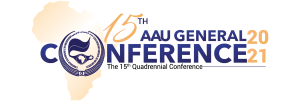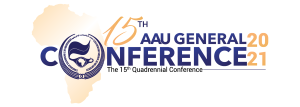About the Conference
The General Conferences of the Association of African Universities is normally a five-day event centered around Higher Education in Africa. On the 5-8 July 2021, the AAU will be holding its 15th General Conference.
The theme of the Conference is:
The Future of African Higher Education
In addition to Keynote Presentations on the theme of the Conference, there will be papers and presentations dealing with the following six (6) sub-themes:
- Sub-Theme 1: The Future of African Higher Education Post-COVID-19
- Sub-Theme 2: Contributions of African Higher Education Institutions to Addressing the Challenges linked to the COVID-19 pandemic
- Sub-Theme 3: Contributions of African Higher Education Institutions (HEIs) in Achieving Sustainable Development Goals
- Sub-Theme 4: Funding of African Higher Education Institutions in the face of unpredictable Economy
- Sub-Theme 5: Mainstreaming e-learning and the digital divide
- Sub-Theme 6: Contributions of the Diaspora to African Higher Education
Follow @AAU_67 or subscribe to stay up-to-date as our schedule develops.
What Happens at AAU General Conferences
The General Conference of the AAU is the highest decision making body of the Association. This is an assembly of representatives of all member institutions, and is organized in two parts as follows:
1.The Business Session:
The Business Session assesses the activities implemented over the previous four years against a background of the Core Programme of Activities and a budget approved at the previous Conference;
-approves the plan of activities and budget for the following strategic plan period; and
-elects the governing board members of the Association including the President and three (3) Vice – Presidents, from among the Vice – Chancellors, Presidents and Rectors of its member institutions
2.The Scientific/Thematic Session:
Every General Conference also hosts the Conference of Rectors, Vice Chancellors and Presidents (COREVIP) of African Universities which deliberates on themes of relevance to higher education in Africa. The COREVIP is an assembly of the chief executive officers of member institutions or their representatives, which meets every two years with the purpose of:
-Examining collectively, themes identified as common concerns and priorities for the development of higher education in Africa;
-Making recommendations primarily to AAU member Institutions, as well as to the Governing Board and to the Secretariat; and
-Acting as a mid-term conference and taking stock of the implementation of the decisions of the General Conference and recommending corrective measures, if any.
|
Our History
The Association of African Universities (AAU), whose headquarters is in Accra, Ghana, was founded in Rabat, Morocco on November 12, 1967, following recommendations made at an earlier conference organized by the United Nations Educational Scientific and Cultural Organization (UNESCO) in Antananarivo, Madagascar in September 1962 for the formation of such an apex organization.
The Antananarivo recommendations were taken up by a preparatory Committee of the heads of African institutions of higher education, which met in Khartoum in September 1963 and drafted the founding constitution of the Association. With an initial membership of 34, the Association now has over 340 members, cutting across the language and other divides.
The Association has provided a platform for research, reflection, consultation, debates, co-operation and collaboration on issues pertaining to higher education. It has provided a range of services to its members and served African higher education in a variety of ways. It has established and increased its role in the five sub-regions of Africa and is thus able, at reasonable notice, to assemble teams of experts in relevant fields from the sub-regions.
The Association possesses a unique capacity to convene higher education institutional leaders and policy-makers from all parts of the continent and on key issues related to African higher education and development, as demonstrated in the WTO/GATS workshop held in Ghana in April 2004. In addition, the Association provides leadership in the identification of emerging issues and support for debating them and facilitating appropriate follow-up action by its members, partners and other stakeholders.


Recent Comments